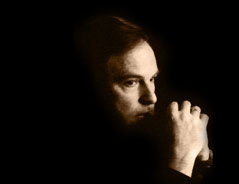
The double life of movie legend Rodion Nahapetov
By Elyse Kaner – Journalist, Minneapolis, MN.
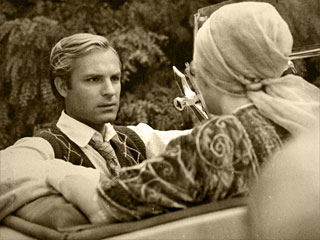 When the humble and slightly shy, gentle man walked into a Russian restaurant recently on Santa Monica Boulevard and headed for a quiet table in the corner, the place erupted into pandemonium.
When the humble and slightly shy, gentle man walked into a Russian restaurant recently on Santa Monica Boulevard and headed for a quiet table in the corner, the place erupted into pandemonium.
Fans applauded wildly. They rushed his table. They bought him drinks. Asked for autographs. They wanted to celebrate the person who has brought hope to so many for his portrayal of valiant heroes on the silver screen.
Yet, just a few short miles away at his home in the City of Angels, he morphs into an ordinary citizen, dressed in shorts, shirt and sandals – the proverbial Everyman who blends in. He greets his neighbors on a morning walk with his perky Pomeranian, Lucky. The neighbors are more likely to know his dog’s name than his. They have no idea who he is.
Occasionally, in downtown Los Angeles people will do a double take. Who is this guy? He looks familiar, they think.
He is Rodion. Rodion Nahapetov, Russian superstar, who lives a dichotomous life, hobnobbing with the famous and leaders of state in one country and living in relative obscurity in another.
"With the exception of maybe a young teen who doesn’t watch TV, everybody knows Rodion in Russia," says his wife of 18 years and film producer Natasha Shliapnikoff.
"It’s not a matter of who would recognize him. It’s a matter of who wouldn’t," she says.
Now settled into in an upscale Los Angeles neighborhood, the Nahapetovs travel to Russia frequently to continue their film work. Then, it’s back to America, where their RGI Productions is in the process of bringing more movies to the public.
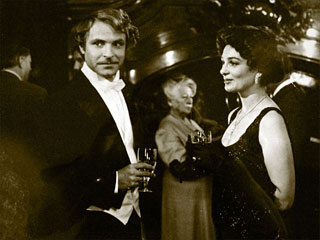 During his prolific film career, Rodion has appeared in more than 60 leading roles, a majority of them shot in Russia, including his first big breakout role in his spot-on depiction of Vladimir Lenin in "A Mother’s Heart," followed by the sequel "A Mother’s Loyalty." Others are: the classic romance "Slave of Love," action-packed drama "Torpedo Bombers" and, most recently, his highly acclaimed, award-winning psychological thriller "Contamination."
During his prolific film career, Rodion has appeared in more than 60 leading roles, a majority of them shot in Russia, including his first big breakout role in his spot-on depiction of Vladimir Lenin in "A Mother’s Heart," followed by the sequel "A Mother’s Loyalty." Others are: the classic romance "Slave of Love," action-packed drama "Torpedo Bombers" and, most recently, his highly acclaimed, award-winning psychological thriller "Contamination."
This year, Channel One, a Russian television channel that broadcasts nearly worldwide, ran a documentary on his life called "Rodion Nahapetov: Russian in the City of Angels."
In America, Rodion has written, directed and acted in the films "Moscow Days, L.A. Nights," "Border Blues," created the popular series for Channel One, "Russians in the City of Angels" and more. He draws on an ensemble of accomplished American actors including Gary Busey, Eric Roberts, Sean Young and Karen Black to bring his films to light.
Unnoticed in America
Still, he has not managed to reach the iconic status in America that he enjoys in Russia for his renowned film artistry. Nevertheless, Rodion enjoys going unnoticed in America where he can walk down the street without being mobbed by adoring fans, snapping photos with their digitals and cell phones. Begging for autographs. Asking small favors.
Living in Los Angeles gives Rodion a reprieve from the rigorous demands of a being a Russian luminary. It’s a place where he can relax, unwind and recharge his creative batteries.
He can venture about casually dressed in a T-shirt, Bermuda shorts and, heaven forbid, with a hint of stubble or a few hairs out of place without ending up in a scandalous tabloid piece accusing him of taking to alcohol and his life going down the tubes.
"We actually have bodyguards when we’re downtown in Moscow," said actor Eric Roberts of "Star 80," "Runaway Train" and "Batman: The Dark Knight" fame, who has worked under the directorship of Rodion both in the United States and Russia.
Roberts, the brother of actress Julia Roberts, has learned patience from the soft-spoken director he describes as sweet and down-to-earth and quiet, yet, reassuring.
"He’s put his arm around me and said, ‘Let’s take our time, shall we?’" says the Academy Award nominated Roberts about Rodion’s directing techniques.
And Roberts has experienced the compassionate side of Rodion. Roberts once, while filming in the Ukraine, spotted a 400-pound brown bear locked in a cage so small he couldn’t turn around. The bear was existing on food scraps and candy fed by children passing by. Roberts enlisted the help of Rodion and Natasha, whose involvement and high-level contact with Kosntantin Ernst, CEO of ORT Broadcasting, resulted in the bear’s release to a specially designed den at the Moscow Zoo. To this day, the bear remains in the zoo where he lives in better surroundings and receives nutritious food. The bear was later named Eric.
The beauty of patience
Although actress Sean Young said she has a certain inner patience, on the set she is less tolerant with people taking up valuable time.
"And he helped me see the beauty in that," she said about Rodion’s patient demeanor when they acted together and he directed her in the "Russians in the City of Angels" series.
Young views Rodion as modest, yet courageous. A professional who doesn’t waste time. A warm person.
"I think there’s a lot to be learned in America in terms of that modesty and that warmth," she said.
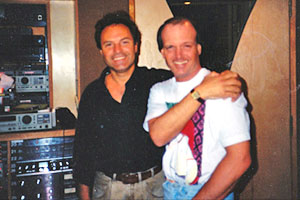 When people saw Rodion in Russia – from ordinary citizens to the higher-ups at the Kremlin – they would approach him with great affection and admiration, said close personal friend and musician George Bigelow of St. Paul, Minn.
When people saw Rodion in Russia – from ordinary citizens to the higher-ups at the Kremlin – they would approach him with great affection and admiration, said close personal friend and musician George Bigelow of St. Paul, Minn.
"They would say, we love you. We love your films. We love your work," said Bigelow, who has collaborated with Rodion musically and accompanied the Nahapetovs to Moscow and Kazan as part of the couple’s charity missions.
Bigelow recalls one incident in particular when two suspicious looking men, dressed in black leather jackets, came out of a casino and started harassing a woman seated in a car.
"I was filming at the time and caught the scene. Suddenly, the two men turned around, looked at us, and started walking towards us. I stopped filming and became terribly alarmed that they would harm us, as crime was rampant at that time in Russia. The men headed directly towards Rodion. One of the men got on his knees, took Rodion’s hand in his, kissed it and said: ‘We miss you. You are our artist. Please come back to Russia. We need you.’
"It was like watching someone meeting the Pope. The other young man said, ‘you are my hero!’ Both men had tears in their eyes as they spoke to Rodion," Bigelow said.
Movies in the making
Currently, Rodion is working on three projects.
He has written a screenplay based on the classic "Dandelion Wine," penned by master legendary writer, Ray Bradbury. The piece is in development.
Two other films are in development in Russia. One is based on a diary written by his mother, who risked her life as a Russian partisan against Nazi Germany during WWII.
The other is about a Russian family in the 1990s after the start of Perestroika, when Communism gave way to a more liberal political and economic restructuring. In this story, Rodion writes about the onslaught of fragmented families with teens turning to a life of organized crime.
As far as his acting is concerned, Rodion has been offered roles in America, but he politely refuses them. They’re mostly mafia characters, an antithesis of the heroes he poignantly plays in Russian cinema.
"I don’t want to accept because I play such great characters in Russia," he says.
When he returns to Russia, something he does about four times a year, inevitably he is asked to resume his acting career there. But Rodion prefers to write and direct. The charge is more multi-dimensional. More engaging, he says.
He spends hours on his craft.
"When I write, I am alone with my thoughts, my ideas, my difficulties," Rodion says. "It’s not like the first line is great. You have to find something that works. Something that’s proper."
He finds the solitude of writing the opposite of directing, an equal passion of his, and an art form that requires weaving separate personalities and ideas into one cohesive unit.
It was Mark Donskoy, one of the greatest classic directors in Russia, who took Rodion under his wing at a young age and mentored him.
"I was like a son to him," Rodion said about the man who planted the seed of his desire to become a director.
Donskoy first discovered Rodion at age 19 when he cast him in the role of Vladimir Ilyich Lenin, the first leader of the Soviet Union, in the epic film "A Mother’s Heart."
"Who is this guy?"
"He’s not the typical Hollywood guy who’s elbowing for attention, said Richard T. Robertson, who regards Rodion as polite and shy. Understated.
Robertson, senior advisor and former president of Warner Bros. Television Group, has dined with Rodion and Natasha at Russian restaurants in the Los Angeles area where fans have swarmed Rodion.
Robertson recalls the mid ‘90s, when he barely knew Rodion. They had met through his friend Natasha. Robertson had an extra ticket to a World Affairs Counsel luncheon. Mikhail Gorbachev, former head of the Soviet Union, was speaking. Would Rodion be interested in attending?
Rodion was new to Los Angeles at the time and hardly knew a soul. In his shy way, he was hesitant to attend. But at Natasha’s urging, he decided to go.
The room at the Beverly Hilton Hotel was packed that day with more than 1,500 guests, Robertson recalls. The Warner Bros. table was in the front row directly under the speakers’ platform. Rodion and Robertson made their way to the table.
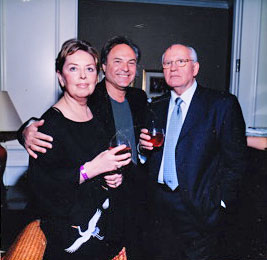 When Gorbachev and his late wife, Raisa, walked in, the luncheon turned into a flurry of excitement. Flashes lit up the room as the press clamored to take their photos.
When Gorbachev and his late wife, Raisa, walked in, the luncheon turned into a flurry of excitement. Flashes lit up the room as the press clamored to take their photos.
First, Raisa approaches the head table. Then Gorbachev, both encircled by the press. Raisa glances at the Warner Bros. table below them and her eyes get "as big as silver dollars," Robertson says.
She waves and Rodion waves back at her. Then, she motions to Rodion to come up to their table.
"They’re speaking two or three minutes in Russian," Robertson says. "I’m sitting there and everybody at the table is saying, ‘Who is this guy? Who did you bring to the luncheon?’" Robertson laughs in the retelling.
Natasha had mentioned that Rodion was a big movie star and director in Russia – and that he was famous for one of her favorite films " Slave of Love." But Robertson had no idea how popular Rodion really is on the other side of the world. Also, Rodion and the Gorbachevs knew each other from the Bolshoi Ballet. Gorbachev’s granddaughter had danced in the company with Rodion’s daughter, Anna.
Once again, Raisa motions Rodion to the head table.
"So now both of them are leaning over and the whole luncheon has stopped while Mr. And Mrs. Gorbachev are speaking to Rodion," Robertson said.
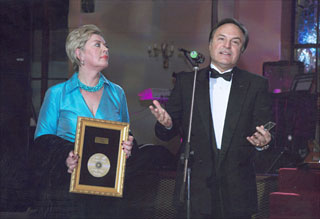 When Rodion returns to the table, Robertson asks about their conversation.
When Rodion returns to the table, Robertson asks about their conversation.
The former president and Raisa wondered why he had left Russia.
He had divorced and had come to Los Angeles to marry Natasha, Rodion told them.
The Gorbachevs said Russia missed him and they hoped he would continue to come back and make films.
The same thing happened a second time three years later at a VIP event in Century City. Warner Bros. had bought seats at a dinner party where Gorbachev was the honored guest. This time, he was alone. His beloved wife Raisa had passed away.
Gorbachev spotted Rodion. He and his entourage, along with his daughter Irina, parted the room. "They came across the room to Rodion. They all hugged and kissed like they do in Russia. Everybody would say, ‘Dick, who is that guy you brought to dinner? How does he know Gorbachev?’" Robertson laughs again.
He grew up in poverty
Rodion’s meteoric rise to fame has been nothing short of miraculous. His is the quintessential rags to riches story, starting from the time he was born.
His mother, Galina Prokopenko, a single, 20-year-old Russian teacher of literature turned partisan against Nazi Germany during WWII, gave birth to Rodion in a battlefield amid blasting bombs, exploding grenades and rapid gunfire.
Despite abuse and repeated rapes by German soldiers and nearly half-alive, Galina, with the help of a Russian soldier, delivered her son into this world in 1944.
She would name him Rodina, the Russian word for homeland.
"She could have lost Rodion very easily," Natasha said. "I mean, how do you make it through running through a mine field? This was smack in the middle of the war. And she saved this child."
Rodion never met his father.
Years later, Galina contracted tuberculosis. Too sick to care for her son, Rodion was plucked from the safety of his mother’s arms, and, at the age of 8, was placed in an orphanage where he got a rude awakening.
The 40 other boys he bunked with in one room stole his toothbrush, comb and winter long johns. He was freezing. But the boys threatened to beat him if he tattled. Food was scarce. He went without. To fit in, Rodion learned to smoke and play rough from the boys. Once, the frightened child overheard the orphanage staff say his mother was dying.
But Galina recovered from her illness and two years later she was reunited with her son. Although she was a literature teacher, she was forbidden from entering schools because of her TB diagnosis. She had no job. No money. She and her young son were reduced to a life of poverty.
Still, Galina managed to scrape enough money together to rent a cot in a corner of a villager’s home for the two of them. However, they were forbidden to enter the house until 10 o’clock at night and were told to be out by 8 a.m. the next morning.
"A family lived there, but we never saw them," Rodion said.
Despite his rocky upbringing, with Galina’s encouragement and her choices of interesting novels for Rodion to read, he managed to graduate from high school.
His life could have turned out differently. Rodion could have easily taken the low road, especially after his impoverished beginnings and his stay in the orphanage. He could have resorted to crime. Fighting in the streets. A life of thievery.
But deep inside, a voice kept telling him to forge ahead.
All the stories his mother had told him of the many who lost their lives in the war, her indomitable courage, and seeing the devastation around him urged him forward.
"It’s not like someone was telling me you have to be serious; you have to get an education," Rodion said about his early years. "I just felt it inside – that my life should be meaningful."
His humble theatrical beginnings
It all started in elementary school. Rodion’s class was staging a New Year’s play. The timid 11-year-old wanted to act in the production, but he was terrified to speak in front of a crowd.
The parts had all been cast, except for one – that of a bear. The role fell to Rodion who by this time had developed the deepest voice in the classroom.
"I was very shy, but because I had a mask, it was easy to hide my shyness," Rodion said, recalling his first forage into theater. More roles followed.
On stage, Rodion enjoyed escaping reality and transforming into other personas. Playing old men. Orating behind a mustache and beard. Graying his hair. Changing his voice. Creating a new character. He particularly enjoyed the applause.
Years later, when Rodion was determined to audition as an actor in Moscow, Galina was surprised. Still, she supported his dream. She had wanted him to become a carpenter. Oh, well. If he failed at acting, he could always go into the trade. Nevertheless, she borrowed enough money from her friends to pay for Rodion’s trip from their home in the Ukraine to the country’s largest city – Moscow, where Rodion auditioned in front of a renowned panel of actors and directors.
"The competition was fierce," Natasha said.
At the time, an actor in Russia had to be accepted into the prestigious Institute of Cinematography of Moscow before he could pursue a path in film and theater. About 3,500 hopeful actors from the entire Soviet Union auditioned. Rodion was one of 16 selected for the coveted spots.
In his second year at the institute, Rodion scored his first big movie role in a love story titled "There Lived Such a Lad." Rodion played a young engineer in a supporting part.
Shortly thereafter, Rodion’s talent caught the eye of renowned Russian director Mark Donskoy. At age 19, he was cast in the prestigious role of Vladimir Lenin, the first leader of the Soviet Union in the film "A Mother’s Heart" in which Rodion played the leader of the Soviet Revolution, Vladimir Lenin from the ages of 16 to 24. It turned out to be Rodion’s breakout role.
The movie was so popular, "A Mother’s Loyalty" soon followed, a sequel in which Rodion played Lenin, spanning the ages of 24 to 47.
To more realistically portray the revolutionary leader, Rodion shaved his eyebrows and scalp. He remained bald for two years.
"It was painful for me," Rodion said about having to shave off his light-brown hair in his early years.
But Rodion’s younger days and his passion for playing the roles of old men had finally paid off. From there, his career snowballed.
The ultimate award
In all, Rodion has starred in more than 60 films and television roles – always the courageous hero, always the good guy. The idea is to give people hope, a philosophy that Rodion embraces to this day.
"He is the characters he plays in his films," Natasha says. "He’s strong. He’s a very stable, humble person. He is in real life what his image is on screen"
In 1983, the Soviet Union presented Rodion with the prestigious Gold Medal Award.
Similar in status to an Academy Award, he received the honor for his outstanding performance in the Russian classic film "Torpedo Bombers" in which he played a heroic pilot who sacrificed his life for his country.
Since then, Rodion has received numerous awards and honors: the Golden Nymph at the Monte Carlo Film Festival, the Golden Femina at the Brussels Film Festival, the National Soviet Union’s Film Festival’s lead actor award for multiple years, the Dovzhenko gold medal for his work as an honored filmmaker, the Venice Film Festival best actor award for "There Lived such a Lad," and a People’s Choice award in Lublin, Poland.
Most recently, in 2008, UNICEF presented Rodion with a humanitarian achievement award for his fast-paced, psychological thriller "Contamination." He wrote, directed and acted in the movie based on a true story of the tortuous treatment of his mother, a dissident, who in the early 1960s was forcefully institutionalized in a psychiatric ward because of her stand against the Communist regime.
A throng of fans gathered to see the film at the awards presentation in Sienna, Italy. People wildly applauded him. They gave him gifts.
"He smiled at me like we just ordered a peanut butter and jelly sandwich," said his stepdaughter, Katia Gray, 25, who attended the presentation. (Rodion is the only father she has known since the age of 5.)
"He doesn’t even react to it at all. He doesn’t change either. He stays with his family unit. You know, some people change, like, hold on honey, I’m in my moment. He’s, like, so what’s going on with you guys?"
Katia gently reminds him that he needs to pay attention to his admiring audience. Rodion kindly reminds her he needs to pay attention to his wife and daughter.
"Family is the biggest deal to him," Katia said.
They met by chance and fell in love
Rodion met Natasha by sheer chance.
In the late 1980s, her neighbor talked her into seeing a film at UCLA. Natasha, a green-eyed beauty, didn’t feel much like going. She was working full-time. She was tired. She would have to get a sitter for her 3-year-old daughter, Katia.
"I kept saying, no, no, no!" Natasha said.
But her friend insisted. Natasha finally gave in, wondering why she let her friend drag her there in the first place.
When she saw the epic movie "At the Close of Night" Natasha was amazed. Who was this Russian director who created this extraordinary work of art? she wondered. She asked Fox Film Studio executives who had bought the rights to the film, but she received no answer. Natasha went home.
A few days later, she gets a call from a friend, a professor at San Francisco State University. Natasha tells him about the film she had just seen, which touched her immensely.
By coincidence, the director, Rodion Nahapetov, is coming to Los Angeles to publicize this same film for Twentieth Century Fox. Would she be interested in meeting him? her friend asks.
Days later, Natasha is on her way to Hollywood’s Roosevelt Hotel to meet the man who would eventually become her husband.
"We started talking and I liked her from the first time I saw her," Rodion said. "She was beautiful. She understood what I was trying to say. There was a connection from the beginning."
In Natasha, Rodion saw an honest woman. Straightforward. Sincere, just like his mother, Galina.
They agreed to meet again. And again. They fell in love.
But Rodion was wrapping up a divorce from his first wife Vera Glagoleva, a famous Russian actress and director. They had two children together – Anna, now 30, a dancer in the Bolshoi Ballet for more than a dozen years, and Maria, now 27, a wildlife artist, specializing in oil paintings.
Rodion and Vera separated in 1988. Three years later, they divorced.
Rodion and Natasha married shortly thereafter.
From fame to relative obscurity
In 1991, Rodion, the famous Russian actor, writer and director, who could hardly walk the streets of Moscow without being mobbed by adoring fans, moved to relative obscurity in America. Unfortunately, the loving couple, swathed in a new life of hope and happiness, crashed into barriers along the way. Years of destitution followed.
At the time they met, Natasha was an independent public relations consultant. Her esteemed duties ranged from consulting for Paramount Pictures to preparing for Pope John Paul II’s visit to America. But her biggest client was the Association of Independent Television Stations in Washington D.C., a lobbying organization for TV stations.
In the early ‘90s, INTV underwent a restructuring and, nearly over night, Natasha lost her biggest client. At the same time, Rodion was trying to establish himself in the U.S. He had promises, but no real offers on his film projects. The couple was nearly broke.
They realized they could no longer afford to live in their large home in Hollywood Hills. Still, they couldn’t bear to sell it.
Instead, they rented the house to the lead singer of a popular rock band. Meanwhile, Rodion and Natasha, with their young daughter, Katia, packed their bags and moved out.
They headed to a small cabin owned by Natasha’s cousin and located in the secluded northern California mountains, not far from Sonora. The Russian superstar and his new bride, a top-notch consultant who once received a special audience with the Pope, had hit rock bottom.
"We felt lost, almost like homeless people," Natasha said. "We had a home, literally, but we couldn’t live in it."
Natasha continued looking for work. She was either over-qualified or not qualified. Rodion continued pitching his projects. Nothing.
A forgotten project
Four months later they got a call from Fox Studios. The studio was still interested in developing Rodion’s film "Umbrella for Newlyweds," which had experienced a successful run in Russia.
So much time had passed since they first pitched the project, the couple had nearly forgotten about it. They figured it was pretty much dead. They had been working with Jessica Lange’s production company Prairie Films and Fox. But they hadn’t heard anything from them for the longest time.
Rodion sped off on a five-hour drive to Los Angeles to meet with Fox.
"The whole time Rodion was driving, I was on my knees praying," Natasha said. "I just knew there was no way we would make it in the mountains. It was so secluded. We were in the middle of nowhere. There was no business in sight. It was like being in exile."
Hours later the phone rings at the cabin.
"We got it," Rodion said on the other end of the wire. "I am writing a remake of my film with my partner Ronald Parker and Jessica Lange is attached to the project."
Natasha’s knees buckled. She nearly fainted.
The project was their passport out of the secluded mountains, but it was in no way the answer to their financial quandary. The money they earned gave them a steady income, plus enough to rent a small, one-room, 400-square-foot cottage, a converted supply room, in Malibu.
They stayed in the cramped quarters for three years.
Rodion and Natasha continued to rent out their home in Hollywood Hills. Months turned into years of financially trying times. Six years in all.
"Even then, he was hopeful," Natasha said. "He was never negative. Sometimes I would catch him very, very sad, but it was always – ‘It will get better. It’s going to be fine. You’ll see.’"
An important call
One night in 1993, the Nahapetovs received a call that would change their lives.
This time, it was from a Russian man, Victor Gurianov. He was crying as he spoke. His seven-month-old daughter, Anna, was dying of congenital heart disease. Surgery in Russia was impossible. They didn’t have the equipment or the training to operate on children with her illness. Rodion was a famous movie star. Gurianov had seen every role he played. Always the consummate hero. Could he please help his daughter? the man pleaded. Without heart surgery, his daughter would die.
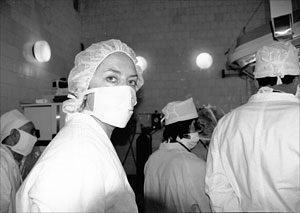 Rodion’s first reaction was to tell him he knew nothing about helping children with heart disease. But a feeling came over the couple.
Rodion’s first reaction was to tell him he knew nothing about helping children with heart disease. But a feeling came over the couple.
"I received it like a sign," Rodion said. "Like someone was testing me, asking me, are you real or are you just acting all the time?"
They decided to help.
After some research, Natasha got on the phone, and after many calls, she found heart surgeon Dr. Taro Yokoyama at St. Vincent’s Heart Institute in Los Angeles.
"Before we knew it, Anna was on her way from Moscow and we were rolling her into the operating room at St. Vincent’s Hospital," Natasha said.
Dr. Yokoyama, with the help of his wife Rita who made the arrangements, saved Anna’s life.
"We all felt fantastic," Natasha said. "We didn’t care whether we were poor or living under a rock. It was such a high to save a life. Anna would have died in Russia."
A life-saving foundation for children
After much research and learning that many children were dying in Russia from congenital heart disease, the couple set up the Nahapetov Friendship Foundation to help save their lives.
Friends and family scoffed at their efforts. They had no money themselves. Were they crazy? Why not let President Boris Yeltsin save the Russian children? they said.
But the calls kept coming. Would the Nahapetovs please help save their kids?
Before long, the couple was on a plane to Russia with a team of American heart specialists from Stanford University Medical Center who donated their time and talents to save the lives of infants and young children dying of heart defects.
For some 8- or 9-year-olds, the disease had progressed too far. It was too late. But the foundation and American doctors managed to save the lives of many infants and young children.
However, their benevolence didn’t end there. The American surgeons mentored Russian doctors, teaching them the intricacies of heart surgery in children. They further taught them how to operate on one-day-old babies with hearts no bigger than the size of a thimble.
In all, the foundation delivered 10-tons of badly needed medical equipment and hospital supplies to Russia. Heart/lung machines. Perfusion bypass pumps. Sternum saws and more.
They helped children in Moscow and Kazan, the capital of Tatarstan.
Also, the foundation brought nearly a dozen children to America for the life-saving surgeries. They partnered not only with Stanford University Medical Center; they teamed with surgeons from UCLA Medical Center, Cedars Sinai Medical Center and Stony Brook University Hospital in Long Island, N.Y.
Although the foundation was fueled by scant operating funds, doctors volunteered their time, drug companies donated pharmaceuticals and concerned citizens donated food for the volunteers.
"We literally had nothing," Natasha said. "The most we had in the foundation was $15,000. But the services we performed and medical equipment was worth millions and millions of dollars that was done for absolutely no money."
The funds paid, in part, for the doctors’ flights to Russia (Russian airline Aeroflot helped with the massive transport of the medical equipment), for food and for various other expenses. In all, the Nahapetovs estimate the foundation has saved the lives of more than 300 children.
Still, the number is inestimable because many kids benefited concentrically from the training the Russian doctors received from the American physicians.
The love made him stronger
Natasha recalls one Russian orphan in particular, Vitalli, a 6-year-old boy suffering from heart disease. He was near death. The foundation flew him to Stonybrook Hospital in Long Island for an emergency surgery.
The hospital agreed to take care of the child on the condition that either Rodion or Natasha would have to stay with him at all times. He had developed a serious infection and needed someone to be with him 24 hours a day.
Rodion flew in from Los Angeles. He hurried from the airport and headed to the hospital where he sat with the sick child. He spoke Russian with him. Comforted him when he cried. He held his hand for two weeks while the child lay in a special incubator, near death.
Eventually, Rodion found some Russian people in the area who volunteered to take shifts watching over Vitalli. One couple Rodion met locally offered to help. They fell in love with the boy. Vitalli’s health began to improve after the complicated surgery.
"Somehow, between Rodion and this couple, they made this child get stronger," Natasha said. "I can’t explain it. It was the love that made him get stronger."
Vitalli underwent pacemaker implantation after initial surgery.
Ultimately, the childless couple adopted Vitalli. This poor orphan child from Kazan, who nearly died of a diseased heart, was delivered from a life of blatant poverty to a life of affluence in America – thanks to the Russian couple and the foundation.
The Nahapetov Friendship Foundation still operates today in an information network capacity. The NFF center is housed in the Bakulev Institute of Cardiovascular Surgery in Moscow. Years ago, the Los Angeles doctors from UCLA, headed by the renowned heart surgeon, Dr. Hillel Lacks, in conjunction with the foundation trained Russian physicians how to perform heart surgery on newborns. Today, Russia is proficient in heart care, Natasha said.
After Rodion’s involvement in the foundation, his luck turned around. His career took off once again. Projects fell into place. He got the financial backing he needed.
He created one film after another: "Stir," "My Big Armenian Wedding," "Blood of Success" and "Contamination." Others were: "Trilogy of Murder," "Moscow Days, L.A. Nights," "Border Blues," "Russians in the City of Angels" and "Mission Possible."
The couple managed to get their Hollywood Hills home back.
A message of hope
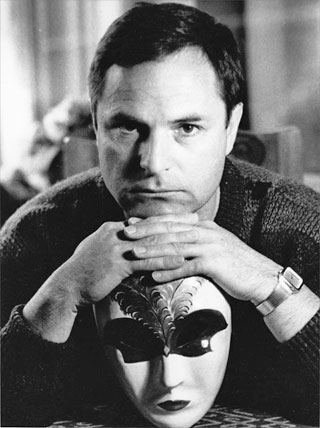 Rodion now divides his time between Russia and Los Angeles. He continues writing screen plays and scripts in hopes of getting them produced. Despite the roadblocks in an economic downturn, similar to the characters he has played in his films so many times, he remains upbeat.
Rodion now divides his time between Russia and Los Angeles. He continues writing screen plays and scripts in hopes of getting them produced. Despite the roadblocks in an economic downturn, similar to the characters he has played in his films so many times, he remains upbeat.
He realizes how unpredictable the film industry can be. In Russia, under the former Soviet regime, the government subsidized his movies. But with the country’s restructuring, change has swept over the industry.
Luck has more to do with launching a film than a well-crafted script, Rodion says.
Still, the opportunity to make a blockbuster film in the United States appeals to him. He is not looking to win an Oscar, he says. Instead, he is looking to deliver his artistry to the public. But he doesn’t wear his hope on his sleeve either. Rather, he keeps it neatly tucked within, nurturing his dreams ever so delicately.
In the meantime, he is realistic. Perhaps, some day a great character role will come his way. A role in which he is not cast as a gangster. Perhaps, a major studio will pick up his screenplays.
Should the stars be aligned correctly, he has several American scripts polished and ready to go.
A generation of Russian audiences is steeped in Rodion’s tradition of stellar acting, writing and directing artistry. In his films, Rodion strives to deliver not only a message of hope; he also wants people to take away a feeling of warmth and goodness. His goal is to ease his audience through hard times.
"Because hope is just an open door," he says. "You try to give people the first step. The hope is still real, but it’s not just an open door. It’s a great, white, brilliant light ahead. You can go further through that door. You can encourage them to take another step."
Rodion sums up his life’s philosophy in six words: "Just open the door and go."